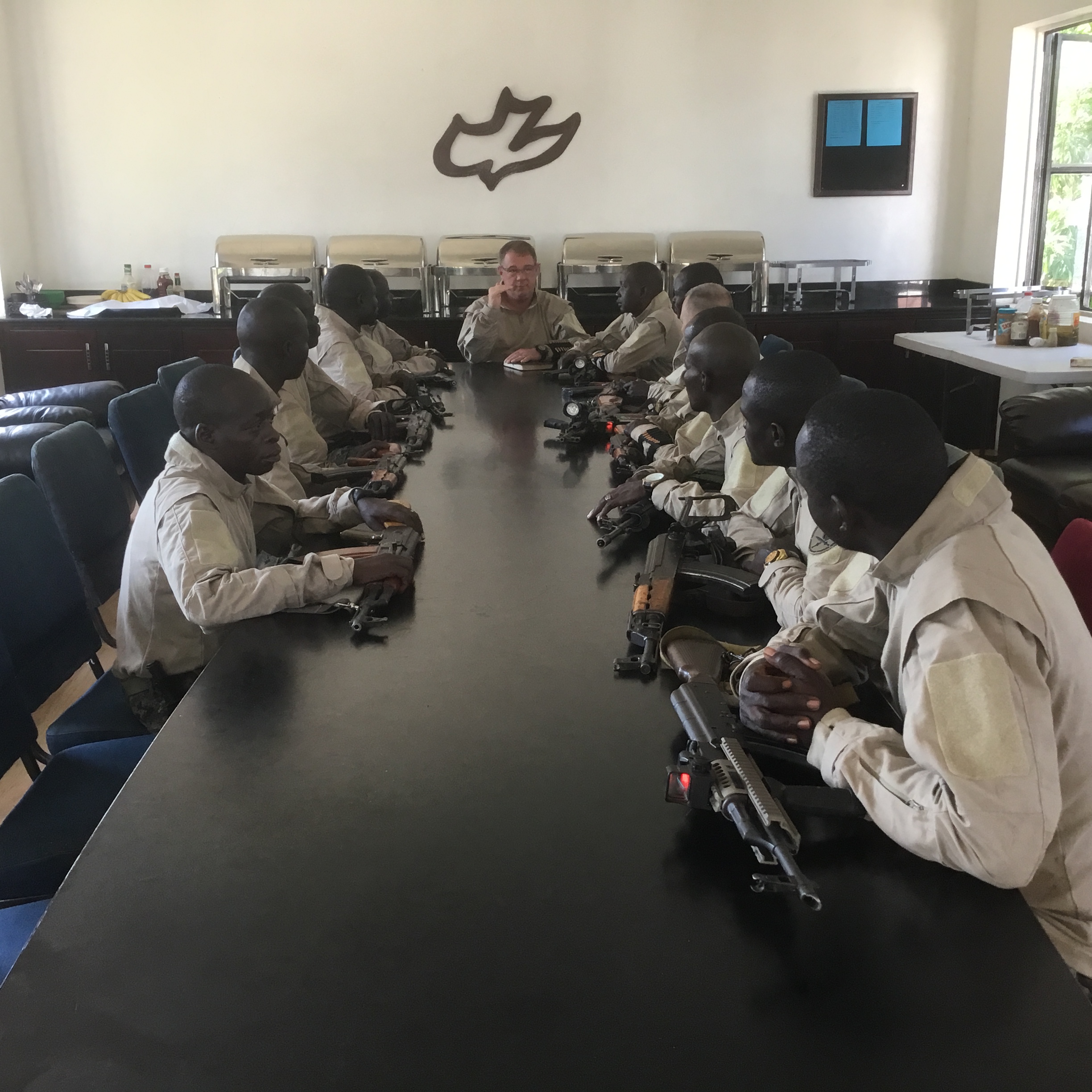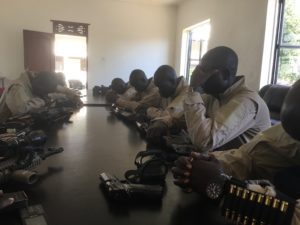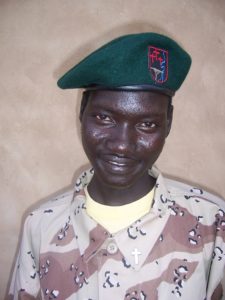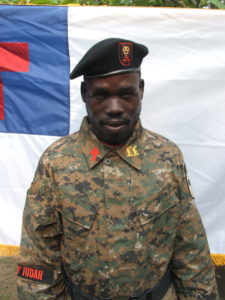
FRM Newsletter
February 2019: They Just Want to Go Home
Read the full February 2019 newsletter here.
I have taken several months from writing much about the war in South Sudan. The truth is that after so many men had been killed, I had to give time for my mind to clear to give the proper attention and thought to how these men lived and died for Christ.

A few years ago, I had a Christian man come into my office with what he saw as a real concern. He felt that we were talking, in our newsletters, as if the war was still going on and that it was misleading. I believe that he was well meaning, but truly did not understand the situation on the ground. I explained to him that while a truce had been signed between the North Sudan and the South Sudan, over certain territories, and that the fighting in the marginalized areas had continued and had become much worse. The South Sudan Army had been fighting in the Nuba Mountains, at the Upper Nile in Darfur and in Abyei. I also shared with him that things were going to get much worse, and all of this was still being sponsored by the Islamic north. At that time, we had lost 13 men in 13 years. In the next three years, from the time I spoke with this gentleman, we would lose 41 men—including 15 in 2018. This is not uncommon for individuals to think they have a better assessment of the war than I have, but unless you are on the ground, you do not see things as they truly are. In the Chaplain Corps, many of the men think that I am a prophet because I have been able to predict the outbreak of fighting on numerous occasions. I tell the men that I am no prophet. When the clouds are black, you can tell it is going to rain. During the Second World War, Neville Chamberlain wanted to tell the British people that they would have peace in their time with Nazi Germany. Yet, any reasonable person could see that there was absolutely no chance for peace.
While the last few years have been tremendously difficult, we have never seen so much fruit being born in the ministry. Even within the Government of South Sudan, the blood sacrifice of the chaplains is well known. Just this week, the vice president of South Sudan came and visited our base and said that we had created a paradise on earth. After the senior chaplains explained to him the vision of the chaplain corps, he said that we need this type of teaching in all the military units. At our last refresher course, where we bring the men in for re-equipping with new equipment and re-arm them through teaching the Word for the battles ahead, a total of eight generals visited our base and all had high praise for the ministry. Even the president had the dedication of our new church recorded and televised several times a day for over two weeks.
The four chaplains that I will speak about in this newsletter all died at the front lines but not from bullets. All had become ill and with the lack of proper medical attention, had succumbed to the illnesses that plagued their bodies. These types of deaths are particularly hard. In a modern army, all these men would most likely have survived, but this is not a modern army. I have seen a lot of men die in the South Sudan and what may surprise many of you that at the last moments of life, as their body begins to die, most want the same thing—they just want to go home. If they are single, they want to see their mom. It is not uncommon for a man’s last words to be to their mother. If married, they just want to see their wives and children and that is where their thoughts are. They will say in their dying breath, “Tell my wife that I love her”. We often look at things from an earthly perspective and feel great sadness for these men. The truth is, they are going home, just not to the one on earth, but to the one Jesus went to prepare for them. The last moments of life are often spent with the men they serve with sitting next to them. While this may seem harsh being far from home in a battle zone, the Lord uses it to bring men into the Kingdom by the examples of how these chaplains lived and died for Christ.
Stephen Lok, chaplain number C00182, John Druku Paul, chaplain number C00040, Peter Monyjok Ajuong, chaplain number C00067, and Isaac Odong Agreement, chaplain number C00083, all lost their lives in 2018. John, Peter and Isaac had all served for almost 20 years in front line combat units. Sometimes, I wonder if the Lord taking them was a reward for 20 hard years of service.
 Stephen served in Battalion 182. He had contracted TB and without proper medical care his race ended having run for 16 years, where he served well. Stephen’s favorite scripture was II Timothy 2:15, Be diligent to present yourself approved to God, a worker who does not need to be ashamed. I believe that after 16 years serving in combat, Stephen did just that.
Stephen served in Battalion 182. He had contracted TB and without proper medical care his race ended having run for 16 years, where he served well. Stephen’s favorite scripture was II Timothy 2:15, Be diligent to present yourself approved to God, a worker who does not need to be ashamed. I believe that after 16 years serving in combat, Stephen did just that.

John’s dream was to serve at the front lines and he did that until his dying breath. He had graduated in class one and had served for 20 years. His favorite scripture was Romans 15:1-2, We who are strong ought to bear with the failings of the weak, and not to please ourselves. Each of us should please his neighbor for his good to build him up.
Peter’s favorite scripture was, Ecclesiastes 3:1, To everything there is a season, a time for every purpose. Peter stated, “I
dream of preaching for the rest of my life. I would like to see many people come to Jesus as their personal Lord and Savior. I want to follow the Lord the rest of my life.” And so, he did. He served 19 years at the front lines, leading many to the faith. He held true to his calling and never stopped sharing the Gospel. In his life, Peter experienced much of the book of Ecclesiastes, and he knew what it meant when it said there is a time for war and a time to die. His reward will be great in heaven.
Isaac’s favorite scripture was John 3:16, For God so loved the world that he gave his only begotten Son so that whosoever believes in him shall not perish but have everlasting life. Isaac wanted to reach the poor and let them know that in this world there will be tribulation, but we are to be of good cheer, for Christ has overcome the world. He had a heart for those who did not have enough to eat and tried to comfort them by feeding them with the Bread of Life. Isaac also served for 19 years. He is now seated at the table of the Lord, where he will receive his just reward.
When Saul met Jesus on the road to Damascus, before he would become Paul the Apostle, whatever his aspirations and dreams were the day before, they would be forever changed. I suspect that Paul had great plans for his life. He was a leading Pharisee with great zeal, who even persecuted the church. By his own account, he was the best of all Pharisees, according to his writings in Philippians 3:4-6 and Galatians 1:13-14. His teacher, Gamaliel, said that the hardest thing he had in teaching Paul was trying to find enough books for him to read. I would not even be surprised if he had aspirations of being the High Priest someday. Yet, on the road to Damascus it all ended. His life was never his again and he said that of all he had attained before Christ, he counted it as rubbish. He had put Christ on the throne and would never again seek a position for his own benefit. What made these chaplains so powerful for the Gospel, is that each, in their own way, has had a road to Damascus experience and their lives were never, ever their own again. This gave them the determination to lay aside their own lives for the life to come. May they enjoy the crowns that they fought so hard to attain.
I recently met a young, single woman overseas who does children’s ministry. I asked her how she liked it, and she said that I do not like children’s ministry, but God has called me to do it. She had been faithful for five years. I told her, I thought her reward in heaven would be great and she started to cry. She wanted to do women’s ministry, but her life was not her own. Just like her, I did not choose to go to South Sudan, God called me. Nor, did I want to fight a war. But, we do not get to choose the battles we fight, but the battles are chosen for us by God.
Wes Bentley
Far Reaching Ministries